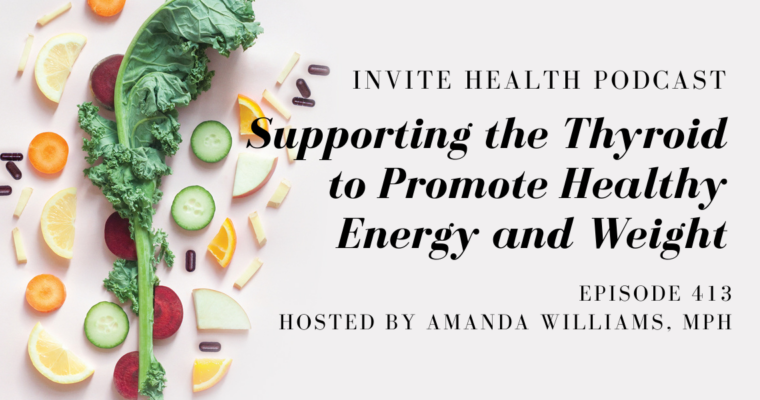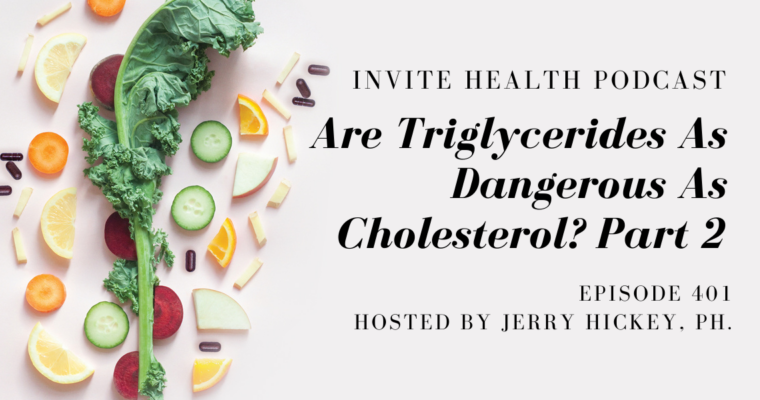Invite Health Podcast, Episode hosted by Jerry Hickey. Ph
Subscribe Today!
Poor thyroid function equals fatigue and terrible health, but the good news is that you can boost thyroid health with certain nutrients! Your thyroid is a small, butterfly-shaped gland located in the neck, just below your voice box. It regulates the ability of your body to convert food into energy, your body’s energy use, your metabolic rate, and the functioning of your heart and digestive system, as well as body temperature, brain development, mood, brain energy, formation of bone and muscle, and so much more.
Your thyroid regulates these things by releasing hormones as needed in a very controlled fashion. Your thyroid secretes two hormones into your bloodstream and they are then carried throughout the body. These hormones are called T4 and T3. T4, also dubbed Thyroxine, is the hormone secreted in a larger quantity by the thyroid gland, but it is less active than T3. T3, or Triiodothyronine, is the active hormone, but the thyroid secretes it to a lesser degree. Fortunately, organs and tissues throughout the body can convert T4 into T3.
Chemicals That Harm Your Hormones & Health – Invite Health Podcast, Episode 140. Listen Now >>
The thyroid is controlled by a gland in the back of your brain called the pituitary gland, which regulates the release of hormones throughout the body. The pituitary gland releases the amount of these hormones in the blood by releasing Thyroid Stimulating Hormone (TSH). TSH tells your thyroid how much T4 and T3 hormone to release, and the thyroid gland produces just the right amount of T4 and T3 to keep levels balanced as needed.
About 30 million people suffer from some type of thyroid condition, with hypothyroidism being the most common. Hypothyroidism is an under-functioning of your thyroid gland. This occurs when your thyroid does not produce enough hormones. Your blood work will indicate this by showing higher levels of TSH. Hypothyroidism is pretty common, especially in women, and becomes more common with age. The condition leads to a slow metabolism, weight gain, fatigue, brain fog, dry skin, changes in the menstrual cycle, high blood pressure, digestive issues, elevated cholesterol, and heart inflammation, amongst others. To hear more symptoms related to hypothyroidism, tune into the full podcast episode.

NUTRIENTS FOR BETTER THYROID FUNCTION
Many people have hypothyroidism severe enough to require taking medication, but certain nutrients are essential in managing the condition. These nutrients may help minimize symptoms and restore thyroid function. Feeding your thyroid optimally with these nutrients may make a huge difference in your energy and quality of your life.
Iodine
Thyroid hormones are a combination of iodine and tyrosine, so it is very important to have adequate iodine levels in your body. Iodine deficiency is rare in the United States, but not getting optimal amounts is very common, especially in people diagnosed with hypothyroidism. You see this often in the Midwest, where people are far from the sea and not eating shellfish and ocean fish like salmon. Conventional blood lab levels do not always give true iodine status. Iodine assists in the conversion of TSH to T3 and thyroxine T4. This conversion is important for the thyroid to function properly.†
Iodine may have other physiological functions in the body as well. For example, it appears to play a role in our immune systems response to infection and might have a beneficial effect on fibrocystic breast disease and growth of abnormal cells in breast tissue. Foods high in iodine include dried seaweed, wild caught cod fish, plain yogurt, iodized salt, wild caught shrimp, pastured eggs, and tuna. Multivitamins generally supply a good amount of iodine. 150 micrograms is all you need a day, but it’s ok if you go a little over.†
Selenium
You only need a tiny bit of selenium, about 50 to 100 micrograms a day. For the thyroid to do its job effectively, T4 needs to be converted into T3. Selenium is a must for this conversion. Selenium also protects the liver and is needed to remove toxins from the body. It is a powerful antioxidant, so it helps reduce inflammation and protect normal cell function by scavenging free radicals. Selenium is also needed for the health of the heart and eyes.†
Zinc
Zinc has been in the spotlight in the time of the coronavirus because it is essential to immune function. In addition to selenium, zinc plays a role in activating thyroid hormones, so you cannot convert T4 into T3 without zinc.†
Vitamin A
A typical source of Vitamin A is the beta-carotene in vegetables like sweet potatoes, yams, and carrots. Most people can convert beta-carotene into Vitamin A in a slow and controlled fashion, but people with hypothyroidism cannot sufficiently perform this conversion. Vitamin A is required to activate thyroid hormone and to normalize TSH. You don’t need a lot of Vitamin A, just about 1500 to 3000 units.†
Vitamin D
Vitamin D is required for proper thyroid hormone function. Also Vitamin D deficiency has been associated with numerous autoimmune diseases and specifically thyroid autoimmune conditions such as Graves’ disease and Hashimoto’s disease. Conventional lab levels of vitamin D are not optimal levels. You really want to have between 45 and 75mg/dl.†
Iron
The trace mineral iron is most significantly found to prevent the formation of reverse T3, which is the inactive form of T3 that blocks the hormone from working. Given the highly active properties of T3 and its short duration cycle, iron is critical to supporting thyroid function. Iron deficiency adversely impacts thyroid hormone metabolism by lowering levels of T4 and T3 and suppressing the enzyme that converts T4 to T3. Iron deficiency related hypothyroidism has been also shown in study to increase the flight or fight response of the sympathetic nervous system resulting in higher levels of stress hormones.†
Tyrosine
The amino acid tyrosine works in a joint effort with iodine to produce thyroid hormones T4 and T3. Tyrosine provides the structural foundation for thyroid hormones. Low levels of tyrosine levels are linked to a reduction in thyroid hormones and a decrease in neurotransmitters like dopamine, affecting the central nervous system.†
B Complex Vitamins
B Complex vitamins are required for forming energy out of food, making the thyroid’s job easier. You can get a lot of these essential nutrients, including Vitamin A, zinc, selenium, Vitamin D, iodine, and B complex vitamins, from a good multivitamin. Tyrosine would be found in its own, separate supplement, but you also get it when you eat protein.†
Thank you for tuning in to the Invite Health Podcast. You can find all of our episodes for free wherever you listen to podcasts or by visiting www.invitehealth.com/podcast. Make sure you subscribe and leave us a review! Follow us on Facebook, Twitter and Instagram at Invite Health today. We’ll see you next time on another episode of the Invite Health Podcast.








